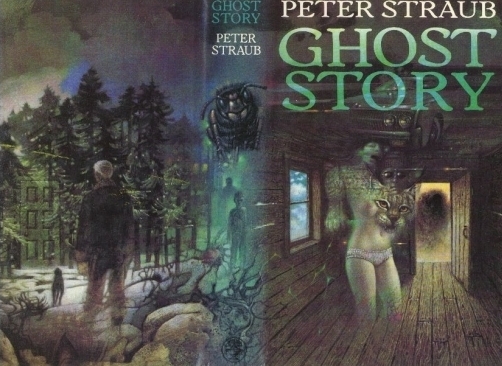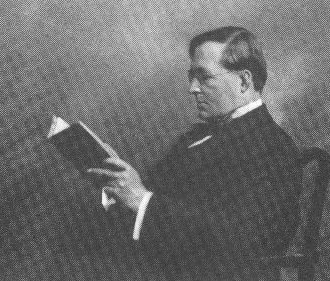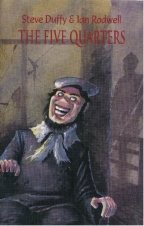Lonely Old Men
The Agony Column for March 18, 2002
Commentary by Rick Kleffel
Reading is a lonely affair. The reader is silent, focused on the
pages of the book in front of him, aloof to the world about him. As
the real world fades, it's natural to think that the people around
the reader are less than real, less alive than those with whom one
shares the pages. Conversely, when the reader pops back into the
world around them, the utter reality of those they considered more
real than real is once again up for grabs. It's no surprise then,
that the ghost story is one of the oldest forms of story told. Once
we enter the realm of fiction, we're all lonely old men.
Ghost stories in particular seem to capture the feeling of being
alone with the pages. As the population ages, splinters, as families
drift apart, as children grow up and move away, those who were once
in our faces every day move to our memories every day, then slowly
give up that lodging as well. They may or may not be alive, yet we
drink to absent friends. Preserved by pictures, by video, loved and
once-loved ones enter a state where the difference between being
absent but alive and absent through death is difficult to
discern.
As the writers in our population age, so their thoughts too turn
to absent friends. Common wisdom might tell us that women have
cornered the market on writing that reveals deep emotional ties and
loss, but in fact it's men who have who hold the majority share on
ghost stories. Men tell one another ghost stories; it's an ancient
sign of friendship between men. Men don't do friendship nearly as
easily, nearly as well as women. Friendships between men involve a
bizarre combination of competition, cooperation, insult and one
upsmanship. When the friends go away, for whatever reason, all we're
left with are ghosts.
Perhaps the publishers are more canny than we think, perhaps the
writers are tuned to the same melancholy country music station, but
whatever the cause, there's been a positive surfeit of excellent
ghost stories haunting the bookshelves of late. If they all tell the
same story, then it's a story that needs to be told. Whether it's
told by Dan Simmons at a breakneck pace in 'A Winter Haunting', or
repeatedly, in one hundred different ways, nearly one hundred years
ago by Montague Rhodes James in 'A Pleasing Terror', or luxuriantly
by Steve Duffy and Ian Rodwell in 'The Five Quarters' or simply, by
Magnus Mills in 'Three to See the King', it's something all men sense
but few wish to face. All men are lonely old men.

|
|
Tom Adams' beautiful gatefold cover for the UK edition
Peter Straub's 'Ghost Story' was available as a 22" by 27"
poster from the publishe, signed by artist and author. The
novel launched the horror genre into a popular and literary
spotlight in the 1980's.
|
Before we caught up in the 21st century version of ghost stories,
it's helpful to look back on the most recent progenitor of these
works, Peter Straub's 'Ghost Story'. Back in 1979, Straub did
something many would have thought impossible. He combined the
literary, deeply moving tale of four men telling stories with the
page-turning power of a supernatural thriller. He did it seamlessly,
without effort, and produced one of the greats of this or any other
century. 'Ghost Story' introduces the reader to The Chowder Society,
four old men with a dark secret who get together to tell one another
ghost stories. The story they won't tell is the one they lived
through, so long ago. Straub imbues the stories with a real sense of
regret, of loss, and of toe-curling, page turning terror. He writes
meta-fiction and stories within stories as if these had never been
invented, as if he had unearthed the literary devices with a hand
spade somewhere in the dirt in his backyard while looking for the
body of a deceased loved one. It's literally a whirlwind of
astonishing writing. It succeeded both commercially and critically,
and launched the horror genre into the 1980's with a power and a
mission that it had never before achieved. It was the story of four
lonely old men, telling one another stories. As we've done for
ages.

|
|
Dan Simmons' 'A Winter Haunting' is both a
page-turning tale of terror and a dense, multi-layered
literary Moebius strip.
|
It's not surprising that a man whose career started as Straub hit
his first peak should decide to enter the haunted, lonesome world of
lost men. Dan Simmons has managed to write in just about every genre
that he can find and to do so as if he always belonged there, as if
he'd lived and read and written in that world his entire life. Back
in 1991, he published 'Summer of Night', which is not a ghost story.
It's a coming-of-age-in-a-world-of-horror tale, boys banding together
to fight something beyond their understanding. Now, 11 years later,
Simmons has returned to that old group of friends, now separated by
time, circumstance and death. In 'A
Winter Haunting', Dale Stewart, one of the boys touched by
something back in the 'Summer of Night', has turned himself into a
lonely old man before his time. In his forties, Dale has left behind
his family and friends after a supremely selfish and stupid affair
with a student at the college where he teaches. He decides to take
some time off, to return to scene of his old crimes, to go back to
Elm Haven. He moves into the house of the character we dearly loved
in 'Summer of Night', whose life was cruelly taken by the author.
There, he does what lonely old men do these days. He sits in front of
the computer screen and types, creates a false version of his past to
paint over old pains. Simmons perfectly captures the young edge of
the lonely old man. Dale is haunted not so much by the Jamesian
ghosts of Jolly Corner, but by his own failures and the
transgressions of the recent past. He reaches out to his distant
past, and something within him, something that is within us all
answers.
But Simmons does something quite unlike your traditional ghost
story here as well. He writes a page-turning, pulse pounding novel of
suspense that keeps you up at night wondering what will happen next.
Subtext is often in your face, then buried quietly in a snowdrift. He
excavates the archetypes and marches them by the window, where they
leave footprints. And he comes up with that one single, unique,
disturbing image that sticks in your brain like burr. It is the ghost
that haunts the reader, long after the book is closed. Ghost stories
are about lonely old men, and lonely old men are scared.

|
|
Montague Rhodes James first perfected the archetype of
the "lonely old man" school of ghost stories. He's haunted
many a man since.
|
The lonely old man pictured in the frontispiece of 'A
Pleasing Terror' is Montague Rhodes James, best known as M. R.
James. He's haunted a lot of us, and this compilation from Ash Tree
Press is going to haunt a lot of people as well. That would be the
people who think about buying it but decide not to. I've mentioned
this compilation before, but in light of Simmons' novels and others,
it bears re-examination. That's because M. R. James is the
quintessential ghost teller of the lonely old man ghost story. He is
that lonely old man. The stories in here should need no introduction
to all but the most casual reader of ghost stories. The presentation
here is as stellar as the stories contained within. Richly
illustrated in a variety of traditional 'ghost story' styles, 'A
Pleasing Terror' is a masterwork of creation, compilation,
scholarship and publishing excellence.

|
|
Steve Duffy and Ian Rodwell introduce the reader to a
drinking bunch of buddies, old in the 21st century, who
reflect on the ghosts they've seen in the 20th century.
|
The one thing, the only thing that could improve 'A Pleasing
Terror' would be the non-ghostly resurrection of M. R. James, or
rather people possessed of the talents and sensibilities of M. R.
James, but driven by their own individual spark of creativity and
brilliance. Not surprisingly, it's Ash Tree Press who has found Steve
Duffy and Ian Rodwell and published 'The
Five Quarters'. The book title is the name of the group of lonely
old men who get together for a good round of drinking and seem to
always end up telling one another ghost stories. If you're thinking
of The Chowder Society, you're not alone. But 'The Five Quarters' is
a very different work, from either M. R. James, or Peter Straub,
though it resurrects the ghosts of their ghosts. 'The Five Quarters'
consists of five stories that grow progressively longer, culminating
in a final tale that is told by all five participants. Each of the
five stories allows the protagonist in the story to establish a
voice. Each of the tellers is a lonely old man, who has so much time
on his hands that he can spend it looking into matters best left
unseen. What Duffy and Rodwell do supremely well is to take the
archetypal ghost story and update it into the 21st century. They
refer back to events in the 1960's and 1980's instead of the 1860's
and 1880's, but they do so with the same wistful regret that M. R.
James did at the turn of the last century. They excavate the
universal sentiment behind these stories and do so at a length which
gives them time to luxuriate in their own fine prose. When the time
for the final tale comes, it is a whirlwind of activity, yet calm and
purposefully laid out. Duffy and Rodwell have supped from the same
table as James and Straub, but their tales are their own.

|
|
Magnus Mills speaks with the voice of a lonely man to
whom the real world is but a ghost in 'Three to See the
King'.
|
From the first paragraph of Magnus Mills' 'Three
to See the King', we know that we're in for a tale told by the
same lonely voice that graces the archetypal ghost story. But Mills
has something seriously different up his sleeve. The 'ghost' so to
speak in his novel is the world as we know it. With complete
confidence and utter aplomb, he lets his narrator lead the reader
into a world where lonely men live in tin houses on a vast plain,
separated by one another by the vast gulf of stultified friendship.
Not knowing how to be friends, they instead collide with one another
like particles in a physics experiment. Mills introduces a woman to
the environment and the entire landscape is tilted, then men collide
until they meet another man who might even be more than a ghost of
himself. But the lonely man triumphs, the lonely man haunts and
outlives humanity. He lets it pass him by. Mills' voice in this novel
has the perfect pitch of a narrator in a ghost story, and his barren
environment might well be the moors of his own England. Religious
metaphor shines through the story like a blazing light hidden behind
a closed portal. Mills' solitary narrator, alone again by choice, by
habit, because he's just a lonely man who likes being alone is like
the undead spirit who chooses to ignore the light. Transfixed by the
beauty of his own loneliness, Mills narrator would rather haunt the
present then join the future.
In the end, all the tales told by the lonely men, all the books
written by the lonely men, exist to comfort the other lonely men --
to let them know that they're not alone in their loneliness. Each of
these novels or collections of stories is simply a Moebius strip, a
one-way, one-sided journey back to the beginning. And of course, one
need not be either a man, old or even lonely to partake of the
feelings of lonely old men. There's a core of that feeling in every
reader, every time a new book is opened. The story is starting.
Prepare to be haunted.




